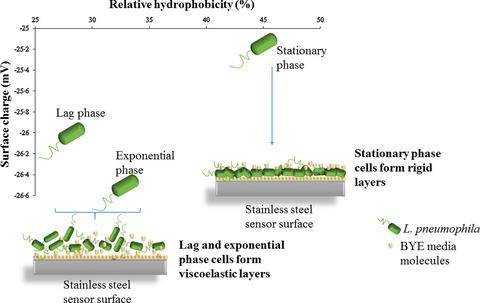当前位置:
X-MOL 学术
›
Lett. Appl. Microbiol.
›
论文详情
Our official English website, www.x-mol.net, welcomes your
feedback! (Note: you will need to create a separate account there.)
Growth phase-dependent surface properties of Legionella pneumophila and their role in adhesion to stainless steel coated QCM-D sensors
Letters in Applied Microbiology ( IF 2.0 ) Pub Date : 2021-05-24 , DOI: 10.1111/lam.13510 S Ariyadasa 1, 2 , G Abeysekera 1 , C Billington 1 , C Fee 3 , L Pang 1
Letters in Applied Microbiology ( IF 2.0 ) Pub Date : 2021-05-24 , DOI: 10.1111/lam.13510 S Ariyadasa 1, 2 , G Abeysekera 1 , C Billington 1 , C Fee 3 , L Pang 1
Affiliation

|
Legionella pneumophila cell surface hydrophobicity and charge are important determinants of their mobility and persistence in engineered water systems (EWS). These surface properties may differ depending on the growth phase of L. pneumophila resulting in variable adhesion and persistence within EWS. We describe the growth-dependent variations in L. pneumophila cell surface hydrophobicity and surface charge using the microbial adhesion to hydrocarbon assay and microelectrophoresis, respectively, and their role in cell adhesion to stainless steel using a quartz crystal microbalance with dissipation (QCM-D) monitoring instrument. We observed a steady increase in L. pneumophila hydrophobicity during their lifecycle in culture media. Cell surfaces of stationary phase L. pneumophila were significantly more hydrophobic than their lag and midexponential counterparts. No significant changes in L. pneumophila cell surface charge were noted. Morphology of L. pneumophila remained relatively constant throughout their lifecycle. In the QCM-D study, lag and exponential phase L. pneumophila weakly adhered to stainless steel surfaces resulting in viscoelastic layers. In contrast, stationary phase bacteria were tightly and irreversibly bound to the surfaces, forming rigid layers. Our results suggest that the stationary phase of L. pneumophila would highly favour their adhesion to plumbing surfaces and persistence in EWS.
中文翻译:

嗜肺军团菌的生长相依赖性表面特性及其在与不锈钢涂层 QCM-D 传感器粘附中的作用
嗜肺军团菌细胞表面疏水性和电荷是其在工程水系统 (EWS) 中流动性和持久性的重要决定因素。这些表面特性可能因嗜肺军团菌的生长阶段而异,导致 EWS 内的粘附和持久性不同。我们分别使用微生物对碳氢化合物测定和微电泳的粘附来描述嗜肺军团菌细胞表面疏水性和表面电荷的生长依赖性变化,以及它们在使用具有耗散功能的石英晶体微天平 (QCM-D) 的不锈钢细胞粘附中的作用监测仪器。我们观察到嗜肺军团菌的稳定增加它们在培养基中的生命周期中的疏水性。固定相L. pneumophila 的细胞表面比它们的滞后和中指数对应物明显更具疏水性。没有注意到嗜肺军团菌细胞表面电荷的显着变化。L. pneumophila 的形态在其整个生命周期中保持相对稳定。在 QCM-D 研究中,滞后和指数相嗜肺军团菌弱粘附在不锈钢表面,导致粘弹性层。相比之下,固定相细菌与表面紧密且不可逆地结合,形成刚性层。我们的结果表明,嗜肺军团菌的固定相 将非常有利于它们对管道表面的粘附和在 EWS 中的持久性。
更新日期:2021-07-18
中文翻译:

嗜肺军团菌的生长相依赖性表面特性及其在与不锈钢涂层 QCM-D 传感器粘附中的作用
嗜肺军团菌细胞表面疏水性和电荷是其在工程水系统 (EWS) 中流动性和持久性的重要决定因素。这些表面特性可能因嗜肺军团菌的生长阶段而异,导致 EWS 内的粘附和持久性不同。我们分别使用微生物对碳氢化合物测定和微电泳的粘附来描述嗜肺军团菌细胞表面疏水性和表面电荷的生长依赖性变化,以及它们在使用具有耗散功能的石英晶体微天平 (QCM-D) 的不锈钢细胞粘附中的作用监测仪器。我们观察到嗜肺军团菌的稳定增加它们在培养基中的生命周期中的疏水性。固定相L. pneumophila 的细胞表面比它们的滞后和中指数对应物明显更具疏水性。没有注意到嗜肺军团菌细胞表面电荷的显着变化。L. pneumophila 的形态在其整个生命周期中保持相对稳定。在 QCM-D 研究中,滞后和指数相嗜肺军团菌弱粘附在不锈钢表面,导致粘弹性层。相比之下,固定相细菌与表面紧密且不可逆地结合,形成刚性层。我们的结果表明,嗜肺军团菌的固定相 将非常有利于它们对管道表面的粘附和在 EWS 中的持久性。











































 京公网安备 11010802027423号
京公网安备 11010802027423号